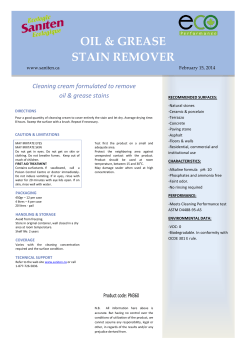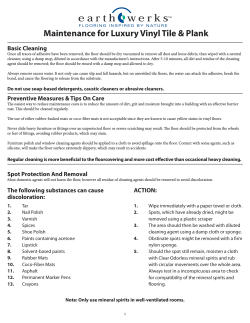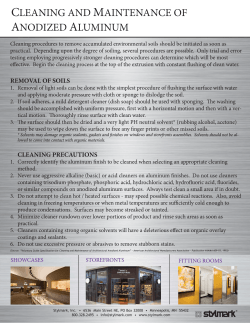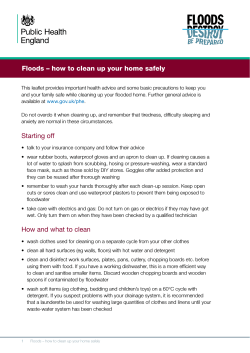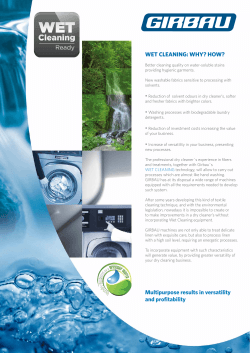
SESLHD PROCEDURE COVER SHEET
SESLHD PROCEDURE COVER SHEET NAME OF DOCUMENT Refrigerators: Food: Use and Care TYPE OF DOCUMENT Procedure DOCUMENT NUMBER SESLHDPR/355 DATE OF PUBLICATION June 2014 RISK RATING Low LEVEL OF EVIDENCE National Safety and Quality Health Service Standard No. 3 ‘Preventing and Controlling Healthcare Associated Infections’ (Criteria 3.1,3.7 and 3.15) NSW Ministry of Health Policy Directives REVIEW DATE June 2019 FORMER REFERENCE(S) Former ‘Refrigerators: Use and Care’ SESLHDPD/109 EXECUTIVE SPONSOR or Prof George Rubin EXECUTIVE CLINICAL SPONSOR Director Clinical Governance AUTHOR SESLHD Infection Prevention Control Working Party SESLHDInfectionControlDL@sesiahs.health.nsw.gov.au POSITION RESPONSIBLE FOR THE DOCUMENT SESLHD Infection Prevention Control Working Party KEY TERMS Refrigerators, food SUMMARY To outline the procedure to be followed to clean blood and body substance spills in refrigerators across SESLHD SESLHDInfectionControlDL@sesiahs.health.nsw.gov.au COMPLIANCE WITH THIS DOCUMENT IS MANDATORY This Procedure is intellectual property of South Eastern Sydney Local Health District. Procedure content cannot be duplicated. Feedback about this document can be sent to seslhdexecutiveservices@sesiahs.health.nsw.gov.au SESLHD PROCEDURE Refrigerators: Food Use and Care 1. PR 355 POLICY STATEMENT In line with NSW Ministry of Health Policy Directive ‘Infection Control’ PD2007_036 and National Safety and Quality Health Service Standard No. 3 ‘Preventing and Controlling Healthcare Associated Infections’, specifically in compliance with criteria 3.1,3.7 and 3.15, SESLHD ensures that refrigerators must be used only for their intended use. 2. BACKGROUND This document outlines the procedure to ensure refrigerators used for food storage in health care facilities are maintained and managed correctly. Vaccine, medication and blood refrigerators are addressed in SESLHD Procedure ‘Medicine: Management of Refrigerated Storage of Medicines and Vaccinations in Clinical Areas’ SESLHDPR/300 and its related ‘Refrigerated Medicine Storage – Temperature Monitoring Form’ 3. DEFINITIONS Cleaning: removal of soil/dirt/dust from surface involving water and physical or mechanical action and a cleaning agent such as a neutral detergent 4. 4.1 RESPONSIBILITIES Employees will: Comply with the procedures outlined in this document. This includes, hand hygiene and the appropriate use of the equipment. Comply with cleaning and maintenance schedules. 4.2 Line Managers will: Use a risk assessment process to ensure equipment is used and maintained as outlined, and that staff are trained in appropriate use. Ensure cleaning and maintenance schedules are maintained. 5. 5.1 PROCEDURE Use Food must not be stored with contaminated material, clinical specimens or medical products such as drugs, vaccines and blood Expressed breast milk and infant formula must be managed and stored in accordance with NSW Ministry of Health Policy Directive ‘Maternity: Breast Milk: SelfManagement’ PD2010_019 Items must be stored in refrigerators in a manner which ensures air circulation Refrigerator temperature should be maintained at the safe food range (below 5 0C). This must be checked and documented daily. Revision 4.5 Trim No. T14/17183 Date: June 2014 Page 1 of 3 COMPLIANCE WITH THIS DOCUMENT IS MANDATORY This Procedure is intellectual property of South Eastern Sydney Local Health District. Procedure content cannot be duplicated. SESLHD PROCEDURE Refrigerators: Food Use and Care 5.2 PR 355 Cleaning and maintenance During cleaning and maintenance the contents of the refrigerator must be stored in such a manner as to maintain the refrigeration temperature. For example in an alternate refrigerator or in an esky with ice bricks Door seals must be in good condition All refrigerators to be cleaned: at least monthly and spills spot cleaned as required by the ward/department cleaning/food service with detergent and warm water and, if not frost free, be defrosted quarterly The cleaning schedule and documentation of the cleaning of food refrigerators must be displayed on the door of the refrigerator 6. DOCUMENTATION Cleaning of refrigerators schedule 7. AUDIT Nil 8. REFERENCES External References: Australia New Zealand Food Authority. Safe Food Australia. 2nd Edition. 2001 Australian Commission on Safety and Quality in Healthcare: Australian Guidelines for the Prevention and Control of Infection in Health Care. 2010 NSW Ministry of Health Policy Directive ‘Maternity: Breast Milk: Self-Management’ PD2010_019 National Safety and Quality Health Service Standard No. 3 ‘Preventing and Controlling Healthcare Associated Infections’ 9. REVISION AND APPROVAL HISTORY Date Revision No. Sept 2004 Author and Approval Infection Control Coordinators Feb 2005 1 Apr 2007 Draft Sept 2008 2 Renumber from Infection Control Manual Section R 1 to SESIH PD 191. No changes made to content. Apr 2011 3 Amendment to reflect change to Local Health Network Apr 2014 4 Amendment to risk rating, addition of Level of evidence Revision 4.5 Approved by Area Policy and Procedure Committee on 10 Feb 2005 and ratified by executive on 21 Feb 2005 for a six month period – review August 05 Former Illawarra Health policy reviewed and merged for SESIH in consultation with SESIH Infection Control Manual Working Party. Contact Helen Newman. Trim No. T14/17183 Date: June 2014 Page 2 of 3 COMPLIANCE WITH THIS DOCUMENT IS MANDATORY This Procedure is intellectual property of South Eastern Sydney Local Health District. Procedure content cannot be duplicated. SESLHD PROCEDURE Refrigerators: Food Use and Care PR 355 Jun 2014 4.5 Approved by Infection Prevention Control Working Party. Updated template and re-formatted by District Policy Officer. Jun 2014 4.5 Approved by Executive Clinical Sponsor, Prof George Rubin, Director of Clinical Governance Revision 4.5 Trim No. T14/17183 Date: June 2014 Page 3 of 3 COMPLIANCE WITH THIS DOCUMENT IS MANDATORY This Procedure is intellectual property of South Eastern Sydney Local Health District. Procedure content cannot be duplicated.
© Copyright 2025


